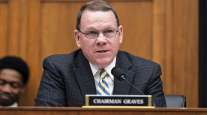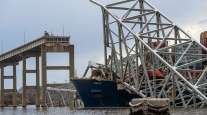Senior Reporter
Freight Executives Urge Congress to Boost Funding for Infrastructure

This story appears in the April 10 print edition of Transport Topics.
WASHINGTON — Increasing funding for freight corridors would help reduce congestion and improve intermodal connectivity, executives representing trucking, port, and rail sectors told senators April 4.
“While funding must continue to come from federal, state and local governments, approximately half of the capital investment in the highway system is provided by the federal-aid highway program,” Werner Enterprises Inc. CEO Derek Leathers said at a Senate subcommittee hearing.
“Without a significant infusion of additional federal revenue, the safety and efficiency of our surface transportation system will continue to deteriorate,” he added.
Omaha, Neb.-based Werner ranks No. 15 on the Transport Topics Top 100 list of the largest U.S. and Canadian for-hire carriers.
Raising the federal tax on fuel and indexing it to inflation would be the ideal approach for restoring long-term funding for big-ticket infrastructure maintenance programs, Leathers said, emphasizing that a federal role in infrastructure “is both indispensable and a responsibility that is delineated by the Constitution.”
FedEx Freight CEO Michael Ducker agreed that lawmakers need to identify sources of revenue meant to provide sufficient long-term funding for the Highway Trust Fund. His company supports a “broad mix” of funding options to “stop the deterioration in many interstate roads and bridges that have long suffered from neglect,” Ducker said.
The trucking industry is among freight sector stakeholders calling on Congress to increase federal fuel taxes to boost the Highway Trust Fund, and alleviate congestion. The trucking industry loses nearly $50 billion a year because of congestion, according to the American Transportation Research Institute.
“We must unclog our arteries and highways and make our infrastructure safer and more efficient by investing in our roads and bridges,” American Trucking Associations President Chris Spear said in a statement.
The Highway Trust Fund, which relies on revenue from gasoline and diesel taxes, is projected to run out of funds in less than four years. The account is used to help pay for big-ticket projects. The 18.4-cents-per-gallon gasoline tax and 24.4-cents-per-gallon diesel tax have remained unchanged since 1993.
Congressional transportation policymakers have rejected raising such taxes while acknowledging a need for approving a long-term infrastructure funding plan. In February, President Donald Trump told Congress to pass a $1 trillion infrastructure funding bill.
As the trucking industry modernizes its operations, regulations to govern autonomous trucks along highways would be needed to ensure the safety of truckers and motorists, argued Sen. Richard Blumenthal (D-Conn.). He added this year the Federal Motor Carrier Safety Administration would issue guidance for states authorizing driverless trucks.
Leathers and Ducker assured Blumenthal that developments in autonomous trucks would continue to require drivers inside the vehicles.
“Total autonomy is years and years away,” Ducker said.
Nearer term, Ducker said federal approval of the nationwide use of twin 33-foot trailers would help to improve safety and boost fuel efficiency across the freight industry.
FedEx is among the companies operating 33-foot twin trailers in states such as Florida.
“Studies have shown 33-foot twin trailers are stable and safe,” Ducker said in written remarks. “They perform equal to or better than current 28-foot trailer combinations in four critical safety measurements: static rollover threshold, rearward amplification, load transfer ratio and high speed transient off tracking.”
FedEx Corp. ranks No. 2 on the for-hire TT100.
As Congress reviews policy surrounding the longer trailers, the Americans for Modern Transportation Coalition, an advocacy group, asked lawmakers to focus on their safety benefits.
“Moving forward, we need to make sure facts are guiding this debate so that all motorists can benefit from a modern system,” Melissa Manson, the group’s spokesperson, told Transport Topics on April 6.
Aside from pushing investments for freight projects, minimizing industry regulations would help to enhance the flow of freight, said Sen. Deb Fischer (R-Neb.), chairwoman of the Subcommittee on Surface Transportation and Merchant Marine Infrastructure, Safety and Security.
“Whether it is a delay to a critical highway project or a new requirement that negatively alters the supply chain, burdensome regulations can hinder progress,” Fischer said. “States need certainty and predictability when initiating key transportation projects.”




